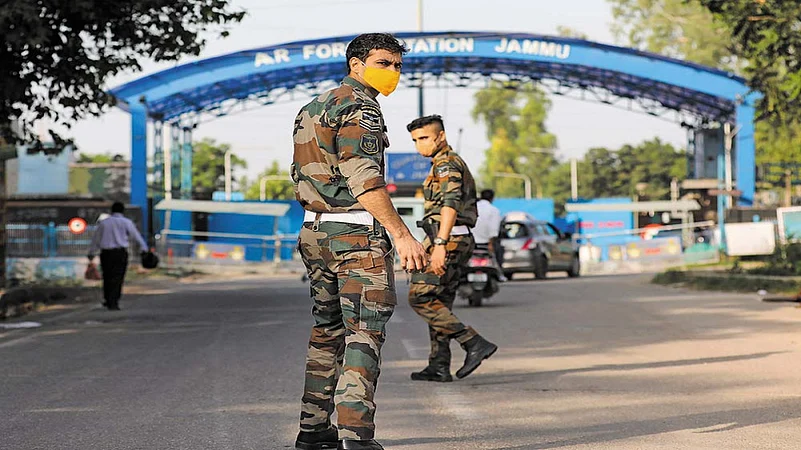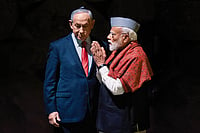The drone attack on the Jammu Air Force base on June 27 adds a predictable twist to tentative peace moves by India and Pakistan, putting at risk backchannel diplomacy for ensuring a ceasefire along the LoC. However, both sides want the ceasefire, which has given the rival armies a respite from daily casualties. India, too, doesn’t want a two-front war, despite assertions by certain generals that India can take on both Pakistan and China simultaneously.
Luckily, damage in the Jammu attack was minimal—the explosives narrowly missed a hangar with several helicopters in it. Since it was estimated to have been launched from Indian territory, no one is tracing this back to Pakistan. But, say experts, this underlines drones to be a clear and present danger.
Though it is in the interest of India and Pakistan to keep the LoC quiet, neither government is in the mood for a broader peace plan. From the Pakistani perspective, Prime Minister Imran Khan cannot climb down from his maximalist position on Kashmir. Furthermore, though Pakistan’s army chief Gen Qamar Javed Bajwa set the ball rolling with talks about peace with India, reports from Pakistan indicate that he may not be backed by all senior generals and the rank and file. Indeed, changing the national narrative, nurtured for decades, of seeing India as Pakistan’s arch-enemy, is not easy. That was evident when the army first asked Imran Khan’s government to lift the ban on trade with India in April and later asked the cabinet to desist. Pakistan had announced the ban in August 2019, soon after the Modi government scrapped Kashmir’s special status. Bajwa went back on his decision to lift the ban when he realised his men would oppose it. The flip-flop, then, was by the army chief himself, wary of the fact that normalising ties with India would be anathema to his soldiers and middle-level officers.
New Delhi’s decision to invite top Kashmiri leaders to meet PM Modi and Amit Shah for talks led to much speculation in Pakistan. Was this, too, part of the back-channel diplomacy? Pakistan’s reading of India—at least from what comes out for public consumption—appears flawed. The accepted opinion is that unless New Delhi reinstates Kashmir’s special status Pakistan will not engage with India.
As every Indian knows, the Modi government will never do that, what with Article 370 being a bugaboo for the RSS and Hindutva parties since independence. In fact, ordinary Indians celebrated the August 2019 decision. During talks with Kashmiri leaders, Modi made it clear that his immediate concern was delimitation of constituencies. Elections and statehood could come later. New Delhi can also tell the world—given there is pressure on India to engage with Kashmiri leaders—that the meeting was the first step in reviving political activity in the Union Territory.
Beyond holding firm to the LoC ceasefire, not much else is on the cards between India and Pakistan. In fact, there can be a resumption of bickering. Last week, after Pakistan continued to be on the grey list of the Financial Action Task Force (FATF), foreign minister Shah Mahmood Qureshi tried to indirectly blame India, telling Radio Pakistan that FATF was “being used for political purposes,” and that “some powers desire to keep the sword of FATF hanging over Pakistan”.
Tension between India and Pakistan is likely to escalate over Afghanistan post 9/11, when NATO and US forces leave. Pakistan will do its best to cut back India’s presence there. “The general security environment will be heightened over developments in Afghanistan. Chinese are staying put in Depsang, and if there is a linkage between Chinese, Pakistan and Taliban’s moves, I would be worried…. They could reactivate LeT and the Haqqani network to destabilise the Valley. India must reach out directly to the Taliban and blunt the Sino-Pakistan mischief,’’ says foreign policy expert P. Stobdan, who tracks the neighbourhood closely.



























